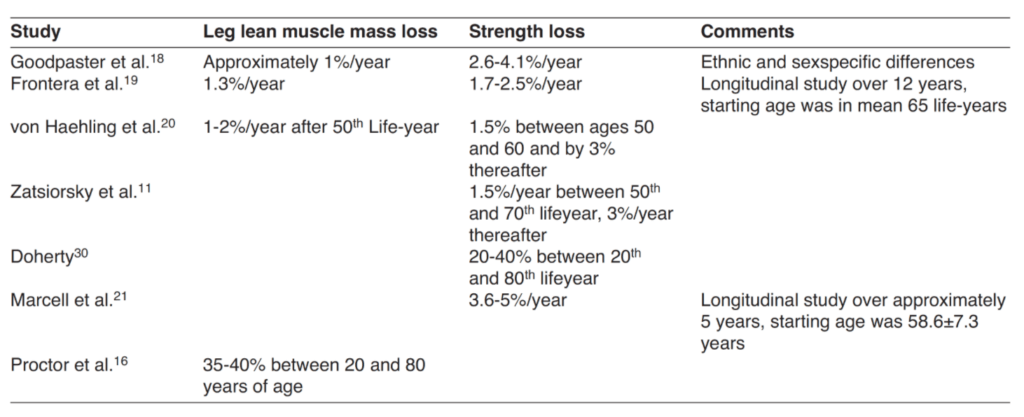This clip is from “Ask Me Anything” (AMA) episode #27, originally released on September 20, 2021.
If you’re a member, you can now listen to this full episode on your private RSS feed or on our website. If you are not a member, learn more about the how to become a member and the benefits here.

Show Notes
Muscle size vs. strength—which has the bigger impact on mortality risk? [58:00]
How much lean mass and strength are people losing by time?
Peter is constantly communicating to his patients about the gravity of aging — just think about what aging is robbing you of as time goes on? “You have got to fight like hell to avoid it”

Figure 9. Strength loss with aging in literature (Keller and Engelhardt, 2013).
- The lowest rate of decline that Peter could see is 1% per year
- Another study showed 1.3% per year
- Others are sort of putting it at one to 2% per year after 50
- Loss of 35 to 40% between age 20 and 80
- And the strength losses might even be greater
- Some studies even showing 4% strength loss per year
*Peter’s important message*
- It’s very difficult to put that in context when you understand what compounding does
- It gives you a sense of what it means to sort of be average when you’re 50.
“If you have the aspiration of kicking ass when you’re 85, you can’t afford to be average when you’re 50.” —Peter Attia
- Either through cardiorespiratory fitness, strength, or probably even muscle mass, to some extent, given its association with strength
- You’ve got to be strong. You’ve got to have muscle mass to accompany that strength.
- You’ve got to have the cardiorespiratory fitness
Selected Links / Related Material
Study looking at muscle mass and muscle strength and the relationship between the two and whether you can tease anything out between them: Associations of Muscle Mass and Strength with All-Cause Mortality among US Older Adults (Li et al., 2018)
Framingham Heart Study: Framingham Heart Study | (wikipedia.org) [53:45]
Study concluding that strength of muscle may be more important than muscle mass: Strength, But Not Muscle Mass, Is Associated With Mortality in the Health, Aging and Body Composition Study Cohort (Newman et al., 2006) [1:00:00]
Episode of The Drive which touched on fasting/calorie restriction and its impact on muscle mass: #171 – Steve Austad, Ph.D.: The landscape of longevity science: making sense of caloric restriction, biomarkers of aging, and possible geroprotective molecules | Peter Attia (peterattiamd.com) [1:15:15]
Episode of The Drive with Layne Norton: #163 – Layne Norton, Ph.D.: Building muscle, losing fat, and the importance of resistance training | Peter Attia (peterattiamd.com) [1:23:00]


